#like what a declaration!
Explore tagged Tumblr posts
Note
Speaking of M. M almost said I love you this book and no one mentions it: “You trust me that much?” “I…” He stumbles on his words, seeming to choose a different answer than whatever he’d almost said. “I trust you with everything, [Name]” They were totally gonna say “I love you”
My goodness, this is such a gut punch of wonderful feelings. I swear I thought something similar when I read that!
Was thinking earlier today about the detective having the opportunity to tell some of the LIs they love them (N 🥰 … and can you actually tell A or was that a terrible fever dream?) …
And I know that you can definitely think it/realize it with M
But!! I do love how the notion and idea of love manifests in different ways with each of these characters. The N mancers get an "I love you but …"
But this? "I trust you with everything"? From M?!? Oh yeah, that's love, even if they don't use the words. I think this actually more powerful than an i love you from M. At this point in the story.
Ah! Love this! Love seeing the evolution of this route!
#it is soft m hours today friends!#i love this so so much!#like what a declaration!#twc#twc m#anon ask
22 notes
·
View notes
Text
fall out boy is so fascinating because anyone who doesnt know anything about fall out boy thinks theyre only relevant to millenials who had intense emo phases while anyone who is a huge fall out boy fan is aware of the fact that every single album they release has gotten them a wave of new young fans. and actually thats not even true because every album second album cycle the fans from the one before the last one are like what do you mean you became a fan during the last album cycle i didnt think anyone was still onboarding. and this is going to go on forever until they retire probably.
edit: i must assume you like fall out boy. consider: fall out boy pins.
buy my art @dilsdesigns
#dils declares#sorry theres this guy thats been doing a what your spotify wrapped says about you series#and his thing for fob was 'millenials. you were born before 1998'#and thats just false! theres 14 year old fob fans right now!#whos first song they ever heard of theirs was love from the other side!#and obviously theres me. hi. but like it seems like itd be the case#but its not.
2K notes
·
View notes
Text
trying to casually explain katsuki’s devotion to izuku is impossible because why does it go from helping him train to RISKING HIS LIFE FOR HIM in a split second
#and it just escalates it never simmers HE KEEPS OUTDOING HIMSELF EVERY TIME#like having a quirk awakening isn’t enough he also has to think of deku when he wakes up in the hospital and fight to get to his room#AND THEN he has to apologize in the rain and call him by his first name AND catch him in his arms#AND THEN he has to panic when separated from him and dedicate his entire fight to what he’s learned… always thinking about deku#IZUKU AS HIS LAST WORD BEFORE HE DIES????#IZUKU AS THE PERSON HE NEEDS TO SEE WHEN HE REVIVES#MOTIVATING IZUKU RIGHT BEFORE HE PASSES OUT#AVOIDING MEDICAL CARE (AGAIN) TO REACH HIM#SOBBING AND DECLARING HOW HE’D LIKE THEM TO SPEND THE REST OF THEIR LIVES TOGETHER#spending 8 years to ensure izuku is by his side as a hero again…#LIKE RELAX?????????#bkdk#dkbk#bakudeku#dekubaku#:’)#ktdk
417 notes
·
View notes
Text

Out of everything that could've possibly made me want to draw I was not expecting it to be a tangled series. But... cassandra you stole my heart
#digital art#fanart#tangled#tts#tangled the series#cassandra#tw bright colors#listen shes just. relatable#and a very tragic character#and i like her design#and disney princesses has never been a trope for me but im here taking part and its literally just for. cassandra#the staff 'purposefully made her as gay coded as possible' (their own words) and yeah. shes lesbian i declare it#apparently thats what was said anyway but it might be a white lie
1K notes
·
View notes
Text

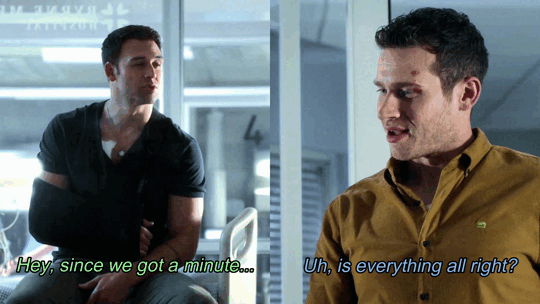
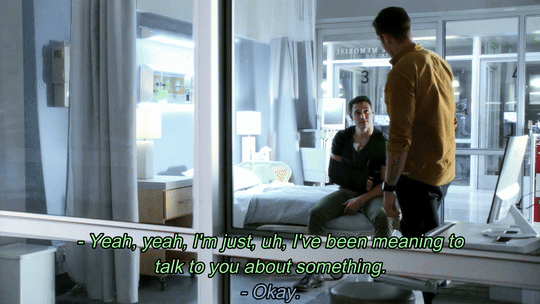

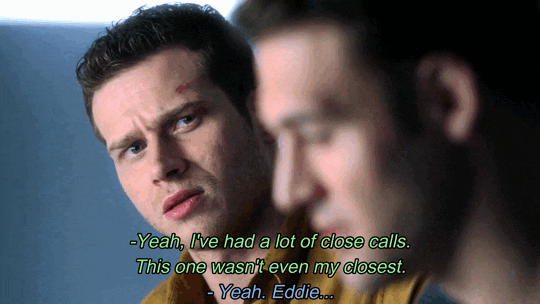
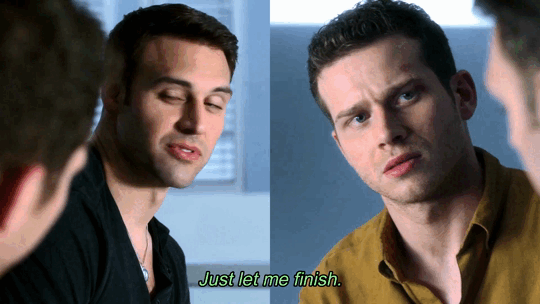
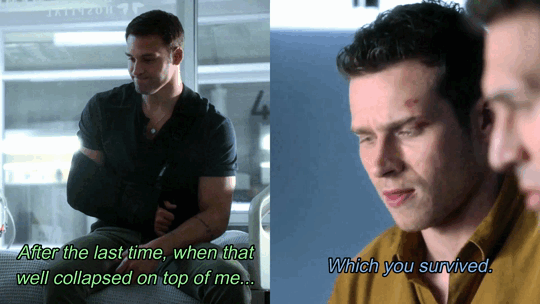
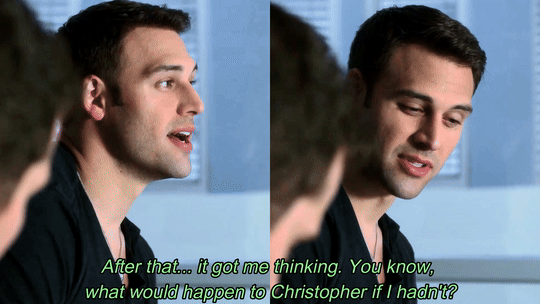

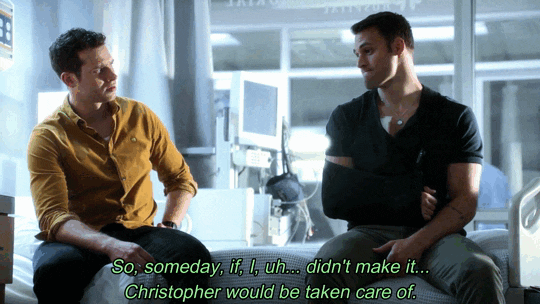
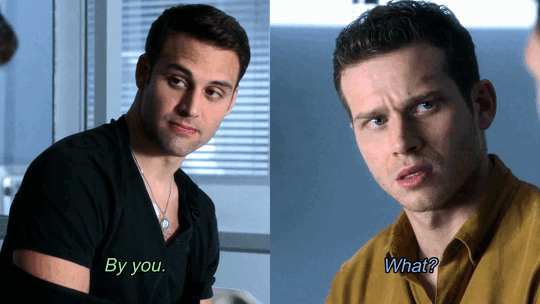

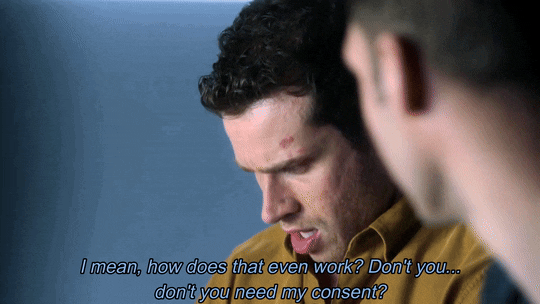

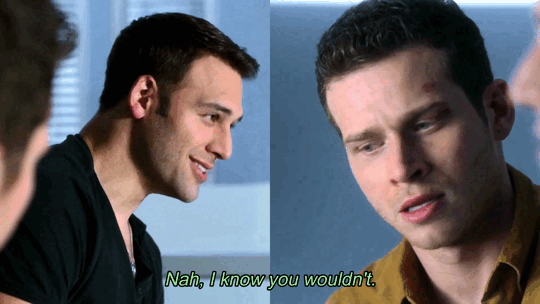
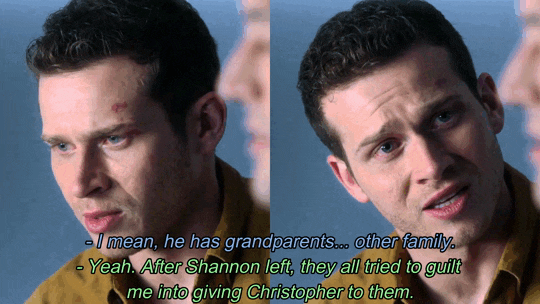
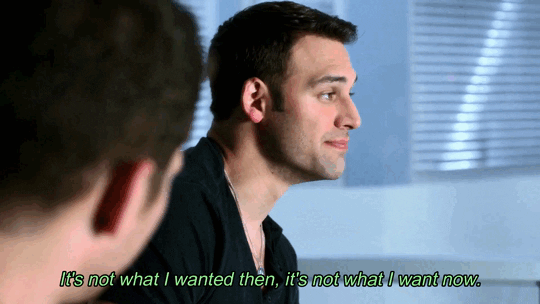
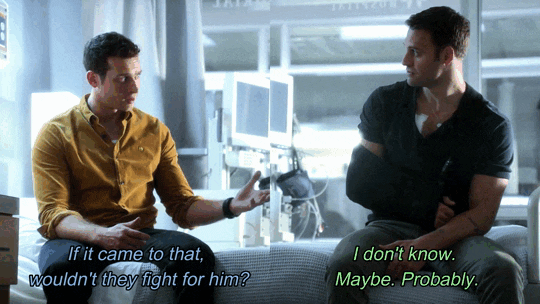

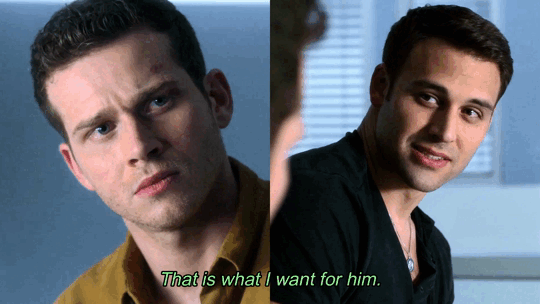
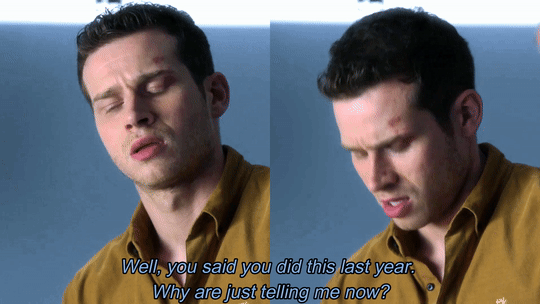

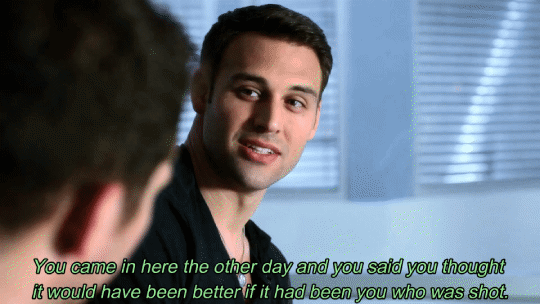
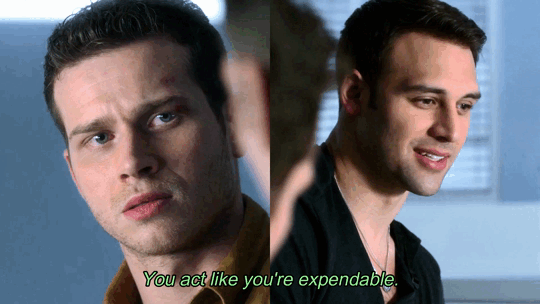
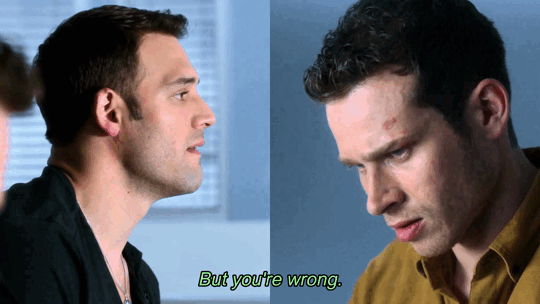
Buddie Countdown to Season 7:
16 days.
#911#buddie#911edit#buddieedit#911 on fox#911 fox#911 abc#evanbuckleyedit#eddiediazedit#my edit#buddies7#911hiatus2023#otp: you don't need to pretend with me#usercam#the fact that this scene is real but they never talked about it again is absolute insanity#what do you mean this happened#this is an aborted love confession#eddie here is fully aware hes in love with buck and i don't care#he knows exactly what hes saying he also knows buck wont call him out on it#its nuts#sure there are a few way to see the way buck interpreted this scene but like#this is a declaration of love no matter how buck viewed it so like#it is#madness#911verse#evan buckley#eddie diaz
714 notes
·
View notes
Text
I guess this might be why the UK seemed to go so antisemitic so quickly
I'm researching the 1947 pogroms in the UK. (Actually, I'm researching all the pogroms and massacres of Jews in the past 200 years. Which today led me to discover that there were pogroms in the UK in 1947.)
From an article on "The Postwar Revival of British Fascism," all emphasis mine:
Given the rising antisemitism and widespread ignorance about Zionism [in the UK in 1947], fascists were easily able to conflate Zionist paramilitary attacks with Judaism in their speeches, meaning British Jews came to be seen as complicit in violence in Palestine.
Bertrand Duke Pile, a key member of Hamm’s League, informed a cheering crowd that “the Jews have no right to Palestine and the Jews have no right to the power which they hold in this country of ours.” Denouncing Zionism as a way to introduce a wider domestic antisemitic stance was common to many speakers at fascist events and rallies. Fascists hid their ideology and ideological antisemitism behind the rhetorical facade of preaching against paramilitary violence in Palestine.
One of the league’s speakers called for retribution against “the Jews” for the death of British soldiers in Palestine. This was, he told his audience, hardly an antisemitic expression. “Is it antisemitism to denounce the murderers of your own flesh and blood in Palestine?” he asked his audience. Many audience members, fascist or not, may well have felt the speaker had a point. ...[The photo of two British sergeants hanged by the Irgun in retaliation for the Brits hanging three of their members] promptly made numerous appearances at fascist meetings, often attached to the speaker’s platform. In at least one meeting, several British soldiers on leave from serving in Palestine attended Hamm’s speech, giving further legitimacy to his remarks. And with soldiers and policemen in Palestine showing increasing signs of overt antisemitism as a result of their experiences, the director of public prosecutions warned that the fascists might receive a steady stream of new recruits.
MI5, the U.K. domestic security service, noted with some alarm that “as a general rule, the crowd is now sympathetic and even spontaneously enthusiastic.” Opposition, it was noted in the same Home Office Bulletin of 1947, “is only met when there is an organized group of Jews or Communists in the audience.”
The major opposition came from the 43 Group, formed by the British-Jewish ex-paratrooper Gerry Flamberg and his friends in September 1946 to fight the fascists using the only language they felt fascists understood — violence. The group disrupted fascist meetings for two purposes: to get them shut down by the police for disorder, and to discourage attendance in the future by doling out beatings with fists and blunt instruments. By the summer of 1947, the group had around 500 active members who took part in such activities. Among these was a young hairdresser by the name of Vidal Sassoon, who would often turn up armed with his hairdressing scissors.
The 43 Group had considerable success with these actions, but public anger was spreading faster than they could counter the hate that accompanied it. The deaths of Martin and Paice had touched a nerve with the populace. On Aug. 1, 1947, the beginning of the bank holiday weekend and two days after the deaths of the sergeants, anti-Jewish rioting began in Liverpool. The violence lasted for five days. Across the country, the scene was repeated: London, Manchester, Hull, Brighton and Glasgow all saw widespread violence. Isolated instances were also recorded in Plymouth, Birmingham, Cardiff, Swansea, Newcastle and Davenport. Elsewhere, antisemitic graffiti and threatening phone calls to Jewish places of worship stood in for physical violence. Jewish-owned shops had their windows smashed, Jewish homes were targeted, an attempt was made to burn down Liverpool Crown Street Synagogue while a wooden synagogue in Glasgow was set alight. In a handful of cases, individuals were personally intimidated or assaulted. A Jewish man was threatened with a pistol in Northampton and an empty mine was placed in a Jewish-owned tailor shop in Davenport.
And an important addendum:
I've read a whole bunch of articles about the pogroms in Liverpool, Manchester, Salford, Eccles, Glasgow, etc.
Not one of them has mentioned that the Irgun, though clearly a terrorist group, was formed in response to 18 years of openly antisemitic terrorism, including multiple incredibly violent massacres. Or that it consistently acted in response to the murders of Jewish civilians, not on the offensive. Or that at this point, militant Arab Nationalist groups with volunteers and arms from the Arab League countries had been attacking Jewish and mixed Arab-Jewish neighborhoods for months.
I just think the "Jewish militants had been attacking the British occupiers" angle is incredibly Anglocentric.
Yeah, they were attacking the British occupiers. But also, that's barely the tip of the iceberg.
Everyone involved hated the Brits at this point. If only al-Husseini and his ilk had hated the Brits more than they hated the Jews, Britain could at least have united them by giving them a common enemy.
#jewish history#jumblr#fascism#antisemitism#when anti-zionism IS antisemitism#seriously if you declare that something is never ever antisemitism we know you're writing yourself a blank check to be antisemitic#like. you may not consciously be aware of it#but the more you're emotionally invested in the idea that anything said or done in the name of anti-zionism isn't antisemitic#the more you will ignore or fail to notice or outright defend things that other anti-zionists do that ARE antisemitic#not to mention things that YOU do or say or believe that are antisemitic#especially because most people aren't very aware of the details of different antisemitic tropes#you're not an expert on what is antisemitic and why to begin with and now you're buying into a belief that muffles your perception of it#and gives you motivation to disbelieve and deny it#and there's already psychological motivation to disbelieve and deny it when it's coming from you or your peers or people you admire#and then there's the belief that jews just cry antisemitism to silence valid criticism#aka the exact thing that we always say marginalized groups don't do. and that it's offensive to claim marginalized groups do. that one.#the entire discourse has been set up to protect and propagate antisemitic beliefs from the start#which is not particularly progressive nor is it necessary if you actually want to support palestinians but go off etc#wall of words
293 notes
·
View notes
Text
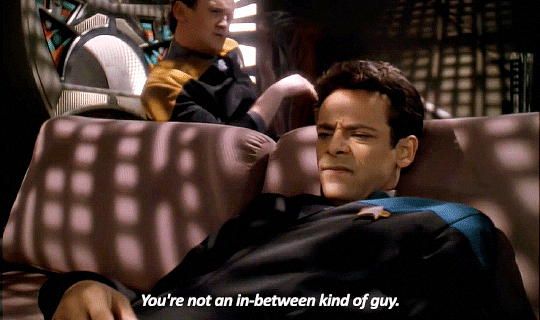

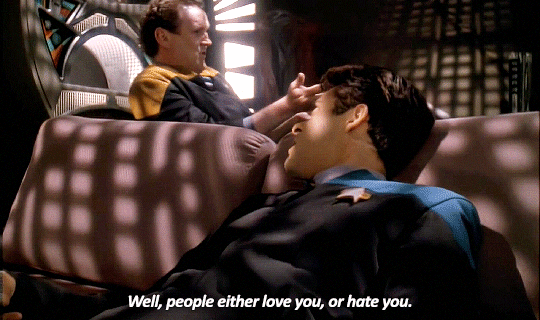
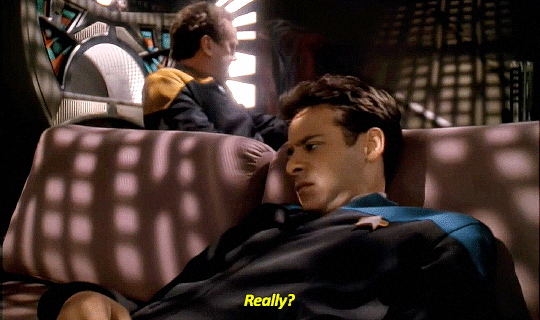
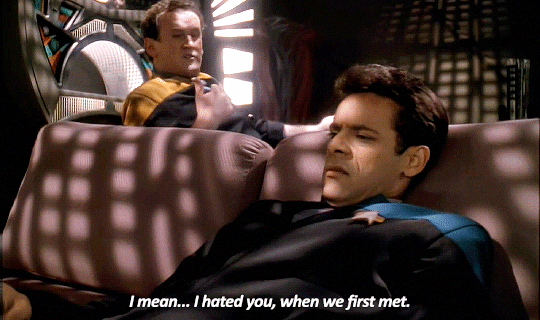
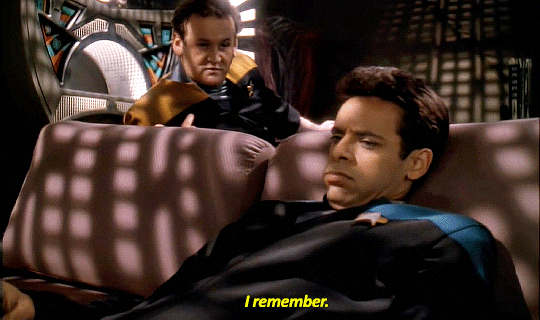



Isn't there some explanation in between?
#star trek#deep space nine#ds9#startrekedit#trekedit#ds9edit#julian bashir#miles o'brien#drkfrcegifs#if he was looking at me like that i would also be declaring my love#i see you miles#and i know what you are
2K notes
·
View notes
Text

I don’t know what context to give honestly, just spent some time sketching him and this came out hell yeah
Oh btw it was also very weird to give him accurate proportions to his body
#httyd#how to train your dragon#hiccup haddock#hiccup#httyd hiccup#art#my art#SHOUT OUT TO LEVI LEVIONOK FOR ME STEALING THE WAY SHE SKETCHES WITH PINK#I just started like this as a joke what if I sketch with pink#and I was going to change it at the end but it looked too cool I didn’t want to change it 😭#anyways I declare myself guilty#she’s way too cool of artist for me to put into words go check her out#oh and tamaGOTCHIIII#he’s a 2000 kid for me don’t ask me why#midnight post cuz I’m too lazy to wait for tomorrow#he’s 20omg….
376 notes
·
View notes
Text
Dorian: I should call Sera "Mrs. Inquisitor" from now on. Maybe teach her to crochet. She'll love that.
Blackwall: So, she finally made an honest woman out of you! I didn't think that was possible.
Cassandra: I wanted to say you looked lovely, Sera.
Sera: Josie wanted me in a dress so foofed you could lose a ham in it!
Sera: This, whatever this is, not our honeymoon. Just so you know.
Sera: If that bint ruins our honeymoon, I will wear her Qun for a boot! Let's wrap it up, love.
Sera: I have a title. It's wife.

#s o f t. this is so soft ashfgkldks#she deserves to know she's loved and appreciated. expressing it publically after her gift scene#where she was under the impression that like everyone else in her life you'd be ashamed of her#but you assuaged her fears by telling all your friends you're seeing her. being proud of and enthusiastic about your relationship#and you can do it again here in the most public way possible. declaring your love in front of your friends and all the world#it's what she deserves 😭😭#sera#dragon age inquisition#dragon age#inquisitor x sera
159 notes
·
View notes
Text





TWD: The Ones Who Live - Finale Opening Scene + Blurred/Faraway
Requested by Anonymous
#the walking dead#the ones who live#twdedit#towledit#tvedit#dailyflicks#dailytwd#michonne grimes#rick grimes#richonnegifs#tvarchive#richonne#otpsource#romancegifs#request#denim rose graphics#i hope you enjoy anon!#I think I created 5 different PSDs trying to get rid of the muted green color wash lol#i always really liked the way they shot this scene#you can tell they went back to the cabin and packed EVERYTHING#they took the black label and the two glasses 😂#there is an open pack of chicken flavor sauce on the table (yes i read the writing lolol before cropping and shrinking)#also i never realized on first watch that was little rj's ax laying beside them and carl's photo#also the drawing mapping out the direction to Jadis's room#just little tidbits to remind us of their journey here#but also everything abt this scene is about UNITY UNITY UNITY#from their actual act of union to the ax being rj's aka the physical embodiment of their union to carl's photo aka who brought them togethe#to their signature weapons laying side by side; to the shot of him sliding the wedding ring on her finger#there was no reason for the ring to be off her finger except to have Rick slide it back in place and reemphasize they are one again#a visual representation of what Michonne declares later in the ep: ‘we are back’
305 notes
·
View notes
Text
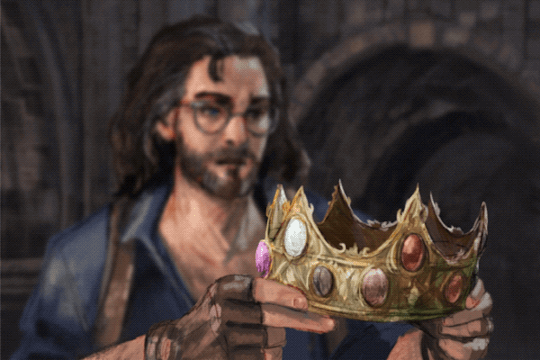
🎶 The Crown…
Pix now wears the Crown… 🎶
—
The moment of recognition when that ancient and powerful thing deep in the catacombs… discovers the Crown.
#empires smp#pixlriffs#empires smp fanart#pixlriffs fanart#empires fanart#empires pixlriffs#empiresblr#floweroflaurelin art#mcyt fanart#mcyt#mcytblr#gif#animated#aha! by making that post about not having time to make fanart I tricked you all into not expecting any#thus freeing myself from the pressure of feeling like I have to get fanart done for major story beats#and allowing me to have the motivation to procrastinate my thesis and make stuff for fun instead!#anyway this is the same crown design I did AGES ago but it’s all tarnished now#I’m so excited to have it back the way everyone covets it is so good#I mean THEE historian sees it and instead of preserving it he puts it on his head and comments on how well it fits??#he’s never had any interest in telling people what to do and then declares himself king and threatens those who disobey with ‘punishment’??#everyone who sees it is driven to do anything in their power to get it for themselves?#what does the Crown want. what does it get out of this. it is so very much a cursed object and I love it
2K notes
·
View notes
Text

› “ Fear, uncertainty, regret. These concepts have always been familiar to me.
But what terrifies me most, is the thought of becoming exactly like them. ”
› Day by day, one digs deeper into the pit of insanity. But what choice did you have, if this fate had been forced upon you since the very beginning?
#drawing hands are actually kinda fun#oh yeah I've been meaning to give the rest of the mtt more attention after hyperfixiating on Killer for a while (still am)#i did this instead of studying 💀#i feel like theres more that I could add but idek what#so i kinda just dropped this and declared it as done#idk if it looks good#but i like it#giggles and collapses on the floor out of exhaustion#murder sans#dust sans#dusttale#sans au#undertale au#digital art#mizu art
213 notes
·
View notes
Text
Vlad (Pheonix): Just giving you a heads up, when it becomes known that you are dating me. You will have to fight through my 6 abominable exes, as well as Gary.
Constantine: Why is the 7th one called Gary.
Vlad: Because that is his name...?
Constantine: No, I mean why is he differentiated from the others?
Vlad: Ah. Because Gary is not my ex, he's just Gary.
Constantine: Then why is he-
Vlad: He likes card games, the others are most likely to try and kill you.
Constantine: Noted.
#dc x dp#dp x dc#dpxdc#dcxdp#dp x dc crossover#dc x dp crossover#You may be wondering#“How does Vlad have 6 exes?”#Well you see young whippersnapper#He's lived a while#So he got around#Only managed to bag 6 people his whole life though#Mosly because of his high standards but still#Gary is just.... Gary.#Vlad played card games with him once and suddenly is declared his friend#Like Gary would fistfight someone for him (Which is what happened to the previous 6 exes so he's the big boss)#(Gary has been deprived of someone playing card games with him so he grabbed onto Vlad first chance he got)#(Vlad cannot get rid of him)#(They also gossip together quite frequently and Vlad brings over treats for said gossip over games)
785 notes
·
View notes
Text
cw: mentions of scarring, canon-typical violence, flashback (not graphic), minor body horror (again, not graphic, mostly just emotional feelings about scars)
♦️♦️♦️♦️♦️♦️♦️♦️♦️♦️
Everyone gave him weird looks when they walked in, quickly schooling their features when they noticed he was awake and watching them.
He didn’t know exactly what that was about.
They had him on a lot of good drugs.
But eventually he got weaned off them, and he noticed the pull of bandages on his side, and his arm, and his neck, and his face.
He was still unable to get out of bed. Still couldn’t even reach his arms above his chest for more than a few seconds.
But he damn sure reached up to feel the cloth and plastic surrounding his cheek. How had he not noticed for days? How had no one bothered him about it?
Maybe they had and he just didn’t notice. The morphine was one hell of a drug.
Wayne was soft, patient with him. Saw him touching it, saw the way his eyes filled with tears. He’d never been particularly vain, hadn’t cared much about what he looked like to others, but this felt bigger than that. This felt like he was changed in a way that everyone could see.
Add it to the list of things people could bully him for.
He cried himself to sleep, Wayne’s hand in his, silently comforting in the way he’d always done.
When he woke up again the next morning, he was alone.
It was the first time he’d been alone since the boathouse.
He could swear he heard bats outside his door, screams coming from the attached bathroom, flashes of someone dying on the ceiling.
He felt the sharp sting of teeth puncturing his skin.
He felt hopelessness creep into his bones as he gave in.
Maybe this time they would finish the job.
“Eddie!”
Steve Harrington’s voice broke through the thoughts, panicked enough to bring Eddie back to his hospital bed within a second of hearing it.
“Shit, are you okay?” He continued, hand brushing against Eddie’s bandaged cheek.
Eddie nodded once, closed his eyes, leaned into the touch.
He could blame it on any number of things if Steve felt weird about it. The morphine, the flashback, the loneliness.
“You’re okay, Eddie. I promise. Won’t let anything happen to you,” Steve whispered.
Eddie believed him.
He fell back asleep with Steve’s hand gently cupping the mangled side of his face.
If Steve could still touch him there, then maybe it wouldn’t be so bad.
♦️♦️♦️♦️♦️♦️♦️
Steve came by every day, sometimes in the early morning, before visiting hours officially started, sometimes well after Wayne had left to get some sleep. He always smiled when he walked in, a genuine one, not the one everyone else gave that was so fully of pity and pain he couldn’t bear to make eye contact. He sat down on the side of the bed, not the chair like everyone else, not scared to be close.
And every single day, without fail, he would run his finger along the edge of Eddie’s bandage on his face, watching his own movements and cataloging any changes.
Eddie sat quietly, still, scared to put words to anything happening. Scared to tell Steve what it meant to him to have someone acknowledge his pain in this way. Scared to think Steve could mean anything by it.
It was easy to pretend Steve was doing this because he cared.
Maybe he did care.
But he didn’t care the way Eddie wanted him to, needed him to.
So he stayed quiet, still.
He watched.
He fell asleep while Steve talked about his day, the kids, what Joyce made Hopper do around the house.
He woke up alone most days, but that was okay, because Steve would be there eventually.
♦️♦️♦️♦️♦️♦️♦️
“You ready to get that thing off?” Wayne asked, gesturing to the bandage.
“Oh. Today?” Eddie suddenly didn’t want to ever be without the bandage. Removing it meant he’d see what was under it.
It meant seeing how much that place had ruined him.
The pull of the stitches hadn’t been as obvious with the pull of the bandage masking it.
But now it’s all he felt.
The nurse smiled at him as she put some antibiotic cream over the area, saying he would probably still have to keep it extra clean for the next week or so while the stitches did their job.
Wayne smiled at him in the way that meant he didn’t really want to smile at all, but knew Eddie needed him to.
Steve didn’t come.
Eddie didn’t sleep.
♦️♦️♦️♦️♦️♦️
He woke up with panic in his chest and a silent scream in his throat.
He woke up with Steve’s hand on his face.
Gentle, soft, but a strong comfort.
“Promise I washed them first. They said we have to be careful about germs,” Steve said quietly.
“You don’t have to. I know it’s…it’s gross. It’s ugly. I’m ugly.”
Steve shook his head. “No. Not gross. Not ugly. Alive.”
“Steve-“
“You’re alive, Eddie. You could have your entire face held together by staples and you would still be a miracle. You’d still be the most beautiful thing I’ve ever seen.”
Well, Steve’s charm wasn’t an exaggeration, was it?
He wasn’t even sure if the skin barely pulled together could blush anymore, or if the heat that should be on his cheek was burning on the outside the way it felt like it was on the inside.
“It’s gonna be awful when it heals. I saw it in the mirror.” Eddie could feel every stitch in his jaw, the few that spread across the corner of his mouth and bottom lip, the ones that were nearly up to his ear. “I’ll always have a crooked face. The scar will always be huge. It’s all anyone will see.”
“Then they aren’t looking.”
Eddie bit his lip, eyes searching Steve’s. “But you are.”
“No. I’m seeing. There’s a difference. I see you. I see what you’ve survived. I see the mark it left on you. I know it wasn’t just the scars that cover your skin.” Steve leaned his head down, touching Eddie’s forehead with his own. “We all have them. And we’re all still here. Your heart’s beating. That’s all that matters to me.”
“Who knew you were so good with words?” Eddie smiled sadly.
“Robin says I’m just good at not having a filter.”
“She’s right as always.” Eddie wrapped his fingers around Steve’s wrist, turning as slowly as he could to kiss his palm. “You’re not scared of it.”
“No. Are you?”
“I’m scared that you’ll change your mind when it’s always there as a reminder of what happened.”
Steve kissed his nose, making him smile for the first time in what felt like years.
“I’ll have the reminder that I got you out of there. That no matter what, the bats couldn’t finish the job. That you were stronger and you made it.” Steve let his hand drop, but quickly laced his fingers with Eddie’s. “I know it’s a lot to ask of you to trust me, but will you? For today?”
“Just today?”
“I’ll ask again tomorrow.”
“And what? Every day after that?”
Steve smirked.
His eyes were glistening with tears, but Eddie could tell it wasn’t sadness or fear.
“If that’s what I have to do.”
They hadn’t even talked about feelings, not really. Nothing that made any sense to Eddie, nothing that they could define. A part of Eddie was still convinced he was in a coma and dreaming this entire conversation up.
But even the nurse had noticed the way Steve watched him, how he touched him, how he fought for him. She said he’d been a firecracker from the moment he carried him into the hospital, dripping blood on the tile, staining the halls with his demands for help.
Wayne said he barely left his side the first day, only doing so when the doctors had told him they would call the cops if he didn’t.
Erica even noticed how things had changed between them, stating that she refused to watch her babysitter and the only DM she had respect for make out.
But Steve held Eddie, made him feel like he could get out of the hospital bed and live a life that wouldn’t keep him running. Steve was there.
Steve might even love him. If not now, then some day.
And Eddie could trust him today.
He could probably trust him tomorrow.
“Kiss me?” Eddie probably shouldn’t. The stitches tugged when he talked, and another mouth anywhere near his wounds was just asking for an infection.
But Steve would be careful. He knew what Eddie could handle.
It was barely a kiss. A graze of the lips at most.
But it was the best kiss Eddie had ever had.
At least until tomorrow.
#steddie#steve harrington#eddie munson#stranger things#drabble#yall I am having thoughts about Eddie with a very large face scar and it led to this#I know people have drawn stuff before but I’m#I mean like what I am thinking is from his bottom lip across his entire jaw#to his ear and then down his neck#and it’s not remotely even or straight#very jagged when it heals because they weren’t really aiming for stitching it straight they just wanted to get it closed#also a firm believer that Steve has no filter at all and is SO GOOD at romantic declarations because of it#like he doesn’t edit anything#if he loves you you’ll know because he says I love you in all words except those at first#anyways wrote this during dessert for my besties birthday dinner so#not checking for typos hope there aren’t any lmao#if my phone autocorrected she’s probably wrong
358 notes
·
View notes
Text
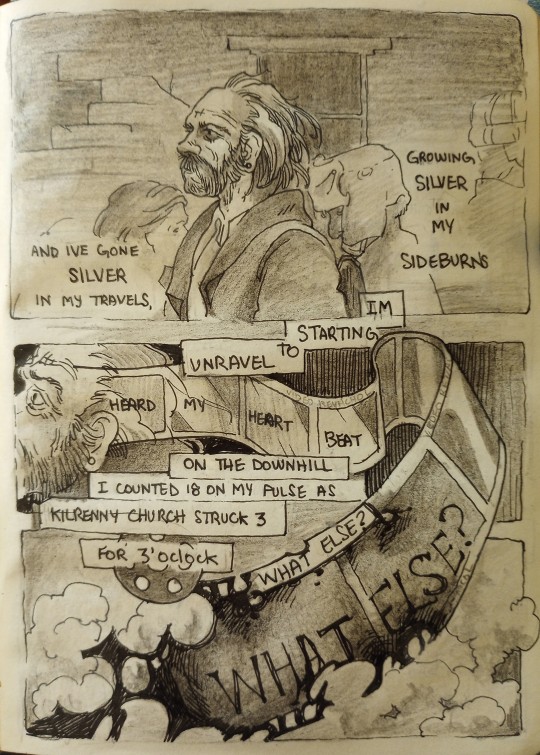
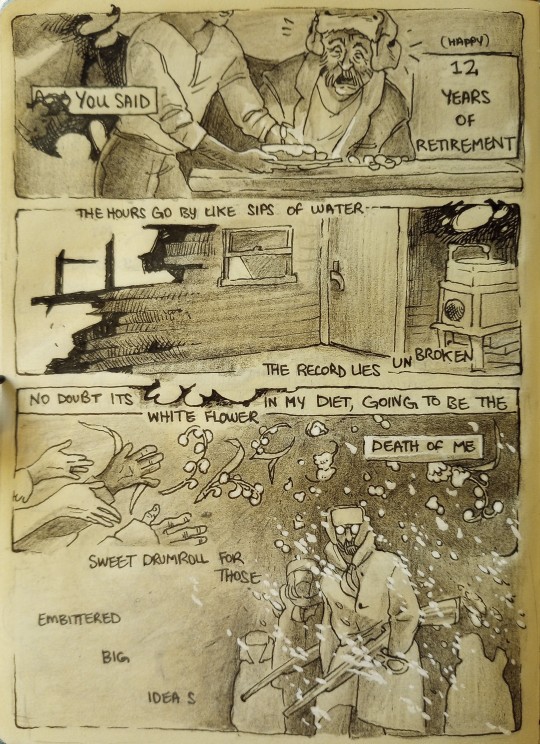
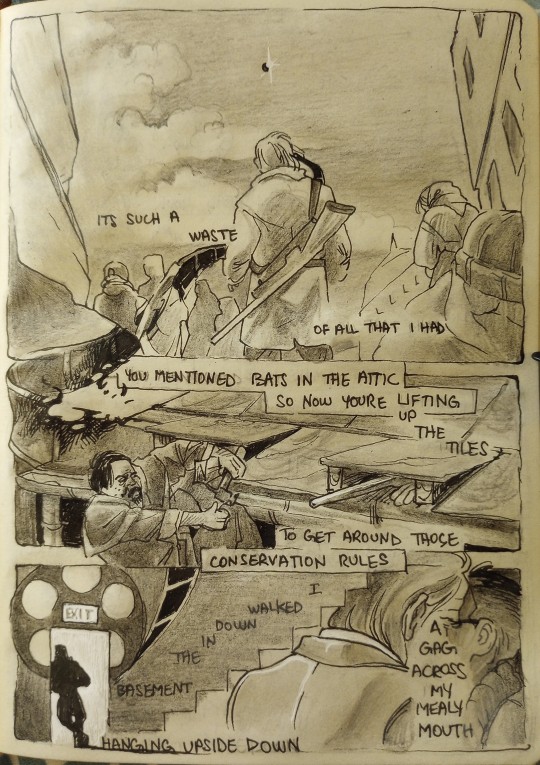
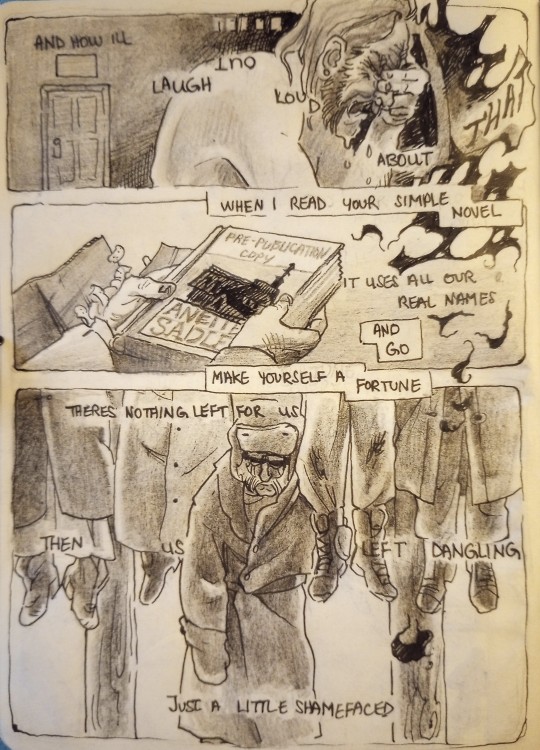
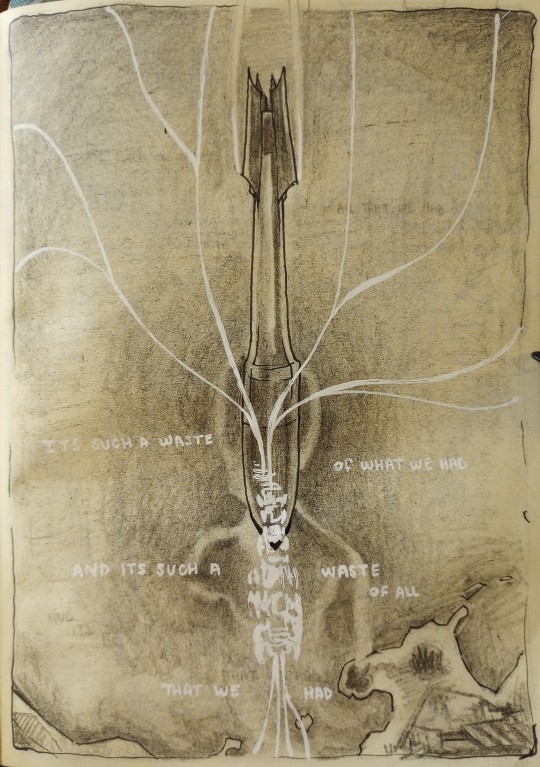
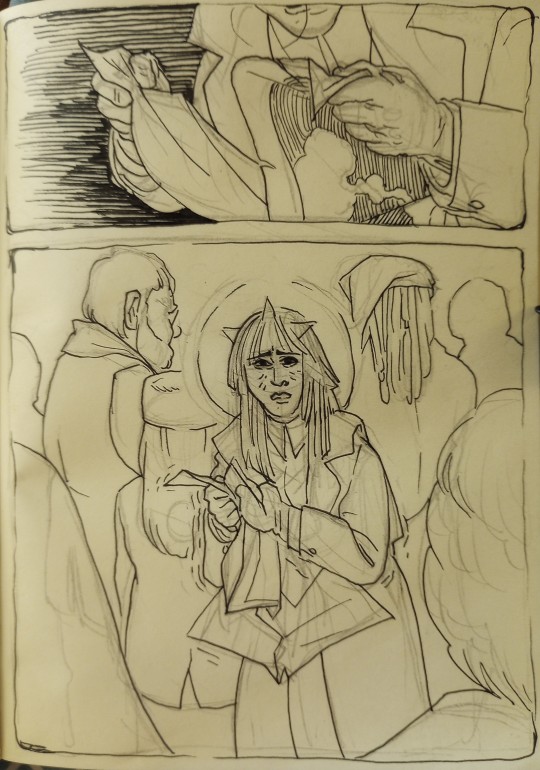
I couldnt finish. Got too sad.
#Disco elysium#So at first i didnt have an idea for an end panel that was kinda cheesey looking and so i was just going to leave it#But then i was like what even is this? Is it a declaration of despair? Is it some kind of masturbation? Is it fake doom tourism?#So i wasnt going to post it. It just felt cruel and inappropriate#But then i was like if even a fictional bombing serves a purpose at all its to radicalize the youth#Thats annette at the end btw. Besides the lorry drivers shes probably the only one not there at the time#Its a declaration of despair btw#Im so sad#Oh fuck i forgot to tag#Hanging#Death#Flashbacks
802 notes
·
View notes
Text
True knowledge exists in knowing you know nothing || Dr. Ratio & Socrates
Okay, I legitimately laughed out loud writing that title, but listen. LISTEN.
Ratio's inspirations derive from many sources; from referencing Archimedes's brain-blast in the tub, to being doomed to have his head bonked by Newton's apple ad infinitum in his idle animation, to his ultimate line ('esse est percipi' / 'to be is to be perceived') a direct quote from Berkeley on Idealism - it's apparent that his design nods towards scholars across time periods rather than being a direct parallel to a singular academic.
Nevertheless, just for fun, I've been rotating Ratio and ancient greek philosophers around in my head and have had a great time chewing over how parallels Socrates in particular. I am in no way saying that Hoyo even thought about Socrates while they were designing Ratio, but I thought I'd share my thoughts. I think there are some worthwhile parallels to be drawn that touch on all aspects of Ratio's own philosophy regarding ignorance, the value of knowledge, and his deep appreciation of life. So, let's get into it.
Ratio is interested in humanity and curing 'ill minds with knowledge', that 'to turn a blind eye to the folly of others is not an etiquette, but a wicked worldly practice.' Ignorance is a disease - this is a concept that can be viewed through a Socratic lens. Socrates believed that that virtue and knowledge were impossible to separate from one another, and that virtue could be developed through acquiring knowledge and insight. If knowledge is virtue, then ignorance is vice. In Socrates's mind, no one would rationally choose to do something bad. People might choose to do bad things, but this is rooted in their own perception of the world - as in, someone would only choose to do something bad (for the world, or for themselves) because they believed (erroneously) that it was the right or good thing to do. To Socrates, the cure to this was knowledge: 'There are two kinds of disease of the soul, vice and ignorance.' & 'What does most harm in the world is not sinfulness but ignorance'.
To Ratio, 'If ignorance is an ailment, it is the duty of the scholars to weed it out and heal the universe'. He views his own ignorance as 'filth' that must be cleansed through methods such as reading. He also views knowledge as a method for humans to overcome their problems - 'Another day has passed. If your problem still hasn't been solved, is it possible the problem is you?' & 'You look distressed. Is something troubling you? if so, you can figure it out for yourself.' These statements sound harsh, but they also clue us into Ratio's philosophy - that through self-examination and improvement, one can overcome one's ailments.
Socrates was also known for being a trouble-maker, he was abrupt and tactless and did not care for someone's social standing nor decorum. He was also known for using what is now called the Socratic method, asking a series of questions that ultimately seek to show contradictions in the beliefs of those who posed them, and to move systematically towards a hypothesis free from contradiction. Socrates rarely made assertions himself - after all, he had no wisdom of his own. But he could interrogate others in order to expose their own foibles, much to the embarrassment and annoyance of those around him. He was once described as a 'gnat' chewing on the 'lazy horse of Athens', causing it to wake up and spring to life due to his persistent gnawing and prodding. Ratio also employs the Socratic method - 'I'm asking questions' - and also adopts sophist tactics such as playing devil's advocate and taking opposing sides (with both himself as seen a story quest, and with others as we see with his texts urging us to take up a side so he might debate us). Through questioning and interrogation, upsetting what we consider social convention and norms, we can dispel contradictions and thereby come closer to some form of truth.
To add to this - as highlighted in the replies below - Ratio’s skill ‘intellectual midwifery’ is a reference to the Socratic method. The idea being that Socrates helped those around him give birth to the knowledge that was already within them, rather than treating his students minds as empty vessels for him to fill with his own answers. Again this is beautifully echoed in Ratio - he doesn’t want to tell you how to live your life, he wants you to work out for yourself what it is you need, thus empowering oneself through self-examination and questioning.
Socrates did not believe in writing anything down. He believed that face-to-face communication was a far more effective way of communicating knowledge - which means, unfortunately, what we know of Socrates is primarily derived from secondary sources. Much of what we know about him today comes from Plato's dialogues, and Plato was known for liberally exercising artistic license.
Although Ratio is not dead, I find it interesting that his character story is told exclusively through secondary sources. To quote - '…There are no less than eight documentaries detailing his legendary exploits, and over a dozen memoirs about him. However, despite the plethora of commentaries, none of them seems to provide a compelling perspective.' It's as though there are no surviving fragments penned by Ratio's hand and all we have to go on is through the lenses of other people. This challenges us, perhaps, to try to think about our own interpretation of Ratio since secondary sources cannot be taken as a wholly unbiased account - and once again employing the Socratic method and empowering the reader to come to their own interpretation.
While Socrates left no writing behind, he was interested in spreading knowledge. Socrates spent most of his life in Athens, a city that was, during his lifetime (~470-399 BC), a hotpot of scholars, wisemen and philosophers. Athena, the Greek god of wisdom, was named after the city - her symbol the owl that is also appropriately perched on Ratio’s shoulder. Also in Athens at this time where the sophists. The sophists were a class of intellectuals who were known to teach courses in various subjects - but often for a high fee, and generally centred around the idea that persuasion and the use of knowledge as a tool was more important than wisdom or truth itself. There's some debate about whether Socrates could be characterised as a sophist himself, but, crucially, he is characterised as refusing to take payment for his teachings. He was born a plebeian (perhaps you might describe it as a mundane background.) He was known to dress in rags and go barefoot, speaking to and (often antagonising) people from all walks of life, preferring the marketplace as a center of debate than palaces or courtrooms. I can't help but think of the sophists as similar to the genius society (or at least Ratio's depiction of them in contrast to himself), cooped up in ivory towers and gatekeeping knowledge to the most privileged. He doubts if Herta's talent is always helpful to others, he compares Screwllum to a 'monarch'. Then again, the sophists may in fact be a bit of a parallel to the Intelligentsia Guild - from Ratio, 'when someone is willing to listen to knowledge that is being disseminated and circulated, a price is created'.
Socrates (or at least the Platonic depiction of Socrates) was at one time declared the wisest man in Athens by the Oracle of Delphi. Socrates balks at this assertion - how can he possibly be the wisest man in Athens when he in fact knows nothing at all? This was not a claim made of modesty - he truly believed that he had no wisdom, that he was unsure what 'wisdom' itself even was. Ultimately, Socrates concludes that the only way that the Oracle could be correct is that by actually acknowledging that he knows nothing he paradoxically is the wisest man in Athens. All wisdom, therefore, is rooted in wondering, with wondering only possible if one is open to admitting one's own ignorance.
What I love about all of this in relation to Ratio is that Ratio styles himself as a mundanite. The Intelligensia Guild advocates that 'all knowledge must be circulated like currency' and accepts 'all beings… who seek to learn'. Ratio has no time for the satisfied self-styling of intellectualism, he himself states that 'to speak knowledge, we must first make people realise their own folly.' No one is above criticism in this regard, even himself - again, to quote 'Whenever someone agrees with me, I feel like I must be wrong.' Again, I feel as though he would resonate with Socrates here: 'Smart people learn from everything and everyone, average people from their experiences, and stupid people already have all the answers'. With Aventurine, he is quick to mock his appearance as over-the-top and vapid - once again making it clear his distate for vanity and hollow displays of showiness (albeit he may have been acting for Sunday's sake here. Also, no comment about this coming from a man who runs around in a toga, lmao) Equally, with Aventurine, it is clear that Ratio is willing to learn from him - he apologises when he offends, he abhors his methodology and yet he still relies upon it and trusts in Aventurine's plan, he is drawn to him in some ways precisely because he is so different to himself. Aventurine (at least styles himself) as impulsive to Ratio's slow and steady methodology, Aventurine whose learning has been entirely self-made vs Ratio who has spent his life in classrooms, Ratio who scoffs at Aventurine's favourite games of chance yet adds slot machines to his simulated universe. And to Socrates, the experience of aporia – in all of its discomfort and disruption – is the very catalyst of wonder, and that wonder was not just the root of wisdom but also the way to live a good and happy life. There is something beautiful in this to me, and this extends to Ratio. Ratio fundamentally cares about life. For all his brashness, his lashing out against 'idiots', his harsh demeanour - he wants people to live good lives, he wants to contribute to the good of humanity - all people, even those he is annoyed by, he cares so profoundly and absolutely about life. The entire reason why he is obsessed with wisdom and learning is not to exalt or elevate himself, not as some kind of ritualistic expression of piety towards a deity, but it is instead an expression of devotion towards life itself. Ratio has a strict work out routine not so that he can show off his body, but because living healthily is living well and working out is a component of that. Even the way he fusses and worries about Aventurine, someone he is pointedly irritated by, reveals how deeply his care runs. So so much of his character is centered on caring for life, even if it is not immediately obvious.
Finally, I'd like to highlight some ways in which Ratio is not like Socrates. First of all, Socrates was repeatedly described as 'ugly' by fellow philosophers Plato and Xenophon - this is contrast to Ratio being repeatedly described as 'handsome'. This is an interesting subversion to me (albeit likely an indulgent one) as in both cases both men attempt to distance their physical appearance from the weight of their words. Ratio wears the bust for many reasons, but way to view it is that he is attempting to stop his appearance from bearing any influence in the subject of debate.
Socrates was also said to be blessed by a divine touch, and as we know, this is something that agonises Ratio as Nous has not yet turned THEIR gaze towards him.
Lastly, Ratio has - thankfully - not yet been ordered by the state to drink hemlock for all his trouble-making and blustering. Though perhaps he may someday be put on trial by the IPC if the theories that he is working alongside Aventurine to undermine the corporation are true - we will just have to wait and see.
Thanks for reading my little ramble. I'd be super interested in anyone's thoughts if they'd like to share, but regardless, I'll leave off on some of my favourite wee quotes from the Rat man:
'Even a life marked by failure is a life worth living - it is only in moments of solitude and despair, when help is absent, that fools grasp how to pick themselves up.'
'Do stay alive. I wish you the best of luck.'
#dr ratio#ratio#aventurine#hsr#honkai star rail#my witterings#i love the rat man so much idk#much of the information i describe about Socrates comes from the podcast History of Philosophy without the Gaps#which I highly recommend if this is your kind of thing lol#but mostly I just wanted to have fun spinning my hyperfixation around lol#Also I make a few declarative statements throughout this but know that I do not claim to be a scholar of greek philosophy lol#please check the verasity for yourselves before relying on what I have to say#for I know nothing u see u see? :P#also I just wanna add in that I do NOT think Ratio is a perfect human being#ratio can be hypocritical and cruel and ignorant just like the rest of us#but I adore that too as afterall he is also an expression of humanity#with all its earthy faults
160 notes
·
View notes